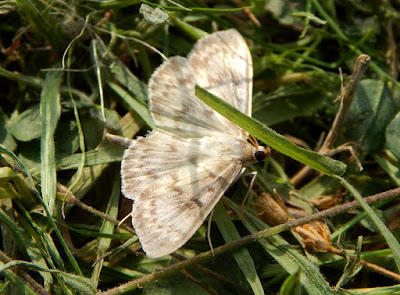Hey everyone, Day 354 today, and before I start on todays blog I want to say a big thanks to BBC Springwatch. I did a little #mypatch video and a clip was on last nights Unsprung, got a nice mention by Chris Packham too so really, really chuffed! You can see the clip here on BBC Iplayer the my patch bit at about 4 minutes in. I'm the 'Little guy in the woods in the rain' :-)
If that wasn't enough I also got asked to do a guest blog for the BBC Springwatch website which I've linked here. Please post a comment on there if you get a minute, I'd love to do some more :-).
Well after all that excitement a little update on @NormanNuthatch - bit worrying today, he flew into the window! After a bit of a rest he was alright but Mum had to keep an eye on him as it took a while for him to get back to normal. I hope Normans #MyPatch video gets on Unsprung :-)
 |
| Mother of Pearl Moth (Pleuroptya ruralis) |
- They are found all over the UK but get less common as you travel north and west, a familiar pattern for most moths I cover.
- They have a wingspan of 26-40mm but are classed as a micromoth, surprising then that hey have a bigger wingspan than some macromoths!
- Mainly active at night they are attracted to light so no surprise it ended up in the moths trap!
- Habitats it likes include gardens, wastelands, rough pastures and nettle beds.
 |
| A bugs eye view |
- They like to lay their eggs on nettles and the larvae spin the leaves together into a tube and feed out of site.
- On Wikipedia it says the rolling action of the larvae has been studied and used to make next gen robots that can roll.
- I think this refers to a tactic its larvae use to escape predators - if they meet a predator they anchor their rears to the ground, recoil rapidly making themselves in to a circle and roll away.
- Apparently this allows them to move away from the predator 40 times more quickly than it would if it crawled!
 |
| And another but not so good |
- They fly from June to September depending on location.
- Their name comes from the lustre (good word) of their wings in sunlight which have a colourful rainbow like effect like mother of pearl!
So that's about all I could find out but form more photos and facts try:
Hope you enjoyed.
Z.
Beautiful moths! - Tasha
ReplyDelete